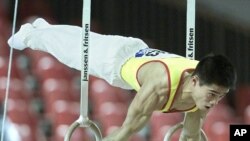Chinese sports stars such as retired National Basketball Association player Yao Ming and tennis star Li Na have made their mark for China on the global stage, rising up from the country's rigid state-run sports system to success in the international arena. However, not all of China's athletes are so fortunate. In fact many, who begin training at a young age, and have known little other than their sport, find it hard to make a living once they leave the court or gymnasium behind.
Zhang's story
Recently in China, the plight of Zhang Shangwu, a retired gymnast and former world champion captured the public's attention and sympathy.
Zhang won gold medals for his performance on the rings at the 2001 World University Games in Beijing. But that ended up being his career peak. He later spent time in jail and last month he was found begging on the streets of Beijing.
Zhang retired from gymnastics a year after he failed to make China’s 2004 Olympic team. After retiring, he was reportedly given compensation and a pension of around $6,000. Down on his luck, two years later and in poverty Zhang says he sold his gold medals for around $10. Not long after that, he was sentenced to nearly four years in prison for stealing.
Not uncommon
Fan Hong, a former administrator at the Chinese Sports Ministry and swimmer who is now a professor at the University College Cork in Ireland, says Zhang is not an exception and many athletes face the same problem.
She says that while the Chinese government has made efforts to try to improve the situation, there are still a large number of elite athletes - especially from minority sports - that face such challenges.
“It's good for them to get Olympics medals, but when they retire it's not really very popular for them to get a sponsorship and endorsement from the business community. So that is a real challenge,” Fan explained.
In China, there are thousands of athletes who rise up in the country's state-run sports system from a young age - focusing all of their energy and time on the prospect of winning a gold medal at the Olympics.
There have been many other reports of former Chinese athletes selling their gold medals to make ends meet.
No preparation
China’s move from a centrally planned economy to a market economy over the past two decades has made life tougher for former athletes. Analysts say educational background and professional capabilities now play a bigger role in hiring decisions, and so elite athletes who spent their youth focused on sports are uniquely disadvantaged.
Fan Hong says before the 1990s, when athletes retired they would find employment as a coach or another job through the government. From then on, the government's policy was for the sports ministry to keep looking after athletes, but focus more on helping them find jobs on their own.
“They provide some opportunities for athletes to go to university after the retirement, and then there are some special policies for those elite athletes," Fan said. "For example if you are a gold medalist at the Olympics, or if you have achieved the top three places in international sports events, [and] you could go to university without the same requirements or scores.”
Fan says sports commissions also provide athletes with some money to set up businesses or to find jobs after retirement, but not everyone is always taken care of.
Conflicting stories
In Zhang Shangwu's case, he says he had a falling out with his coach when he was disqualified from the national team and that his coach refused to help him get into a sports college.
A report from the state-run Xinhua news agency told a different story, however. Xinhua quoted his coaches and provincial sports officials as saying they tried to help Zhang and that he had violated the rules of the team that he was on at the time. The report said Zhang failed to change his ways after repeated efforts from his coaches and team leaders.
Hu Xingdou, a professor at the Beijing Institute of Technology says regardless of what may have happened with Zhang, the system needs to change.
“Objectively speaking, these people did not have much of an education growing up," noted Hu. "It would be difficult to train them for different jobs. The country should provide these retired athletes with a more comprehensive social protection program, so that these people who have contributed so much to the country can comfortably retire and have some type of a safety net.”
Change of luck
But for individuals like Zhang Shangwu, it may already be too late for such changes to help them at all. Luckily, in his case there has been an outpouring of job opportunities following media coverage of his story. In late July, Zhang began working for a wealthy Chinese businessman, Chen Guangbiao, who offered him a job as a personal trainer for himself and his employees.
“I think that in this society there are many young people like Zhang Shangwu. There are many who need our love, who need people with a sense of social responsibility to help them,” Chen said.
Chen says that in addition to helping Zhang find a job, he will try to help him meet a girlfriend and maybe even settle down and start a family.




